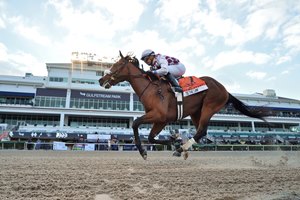Gulfstream's Race Quality Remains High During COVID-19


Late March and early April regularly bring an exodus of stables from Gulfstream Park as some horsemen who wintered in the state send their runners northward for spring racing at tracks such as Keeneland or Aqueduct Racetrack.
Amid COVID-19 health restrictions that canceled those two meets, suspended others, and postponed the openings of yet more, this year many barns are remaining in place in South Florida, where racing continues without spectators at Gulfstream. Faced with this different horse population, Gulfstream racing officials have begun to alter the types of races they originally intended to card in April for its ongoing spring/summer meet.
Illustrating its deep horse population, the track has 13 races April 11, including three allowances and three maiden special weight races, the caliber of which is more often seen during its championship meet in the winter. This was one more race than scheduled, "just to give the fans an opportunity and the horsemen," Gulfstream Park vice president of racing operations Mike Lakow said.
Gulfstream racing secretary Dave Bailey plans to modify some of Gulfstream's races in the track's next condition book, which will follow the current one that goes until April 19, Lakow said. Two $75,000 overnight stakes races will be added, the Unbridled Stakes for 3-year-olds at 1 1/16 miles on dirt April 25 and the Sunshine Forever Stakes at the same distance on turf for older horses May 9.
"We plan to have a 3-year-old filly race a little bit later as well, a mile and sixteenth," Lakow said.
These races supplement six ungraded stakes planned by Gulfstream in May.
"As far as the condition book itself, we're just feeling our way through and we're writing short books just to see how this plays out," Lakow said. "What we don't want to do is find ourselves writing a book and all of a sudden, a lot of our horse population leaves, and then we're stuck. So we're playing it slow and steady at this point."
Provided Gulfstream continues racing—it has faced pressure from Hallandale Beach government officials, and Florida Gov. Ron DeSantis has gradually increased his COVID-19 directives—the track could stage its first 2-year-old races April 16-17.
"When all this happened, I held off allowing 2-year-olds to come in. I didn't know if we'd be racing, and I didn't want to have a full barn area (of 2-year-olds) and say, 'Sorry, we're closing down,'" Lakow said. "However, most recently over the last week or two, we've allowed 2-year-olds in. I'm hoping they have enough at the farms to be prepared to run our first couple of 2-year-old races."
Gulfstream, like other tracks still underway, has felt the impact of no on-track wagering, which awards the track and horsemen a higher percentage than wagers placed via advance deposit wagering platforms. The track is also not operating its casino, revenue from which a portion goes to purses.
"Right now we're holding our own," Lakow said of the Gulfstream purse account. "Just four days into this new meet, we really don't want to make any new changes at this point. Right now we're comfortable, but also we have to be prepared to race year-round. We race 12 months a year in South Florida. So we're watching. "
Though horsemen in Florida, where racing also continues at Tampa Bay Downs, are in a far better position than many of their counterparts in other states where racetracks are shuttered, South Florida horsemen are still being affected by safety protocols that The Stronach Group, which operates Gulfstream Park, has instituted.
One of those is a quarantine regulation for horses who travel out of state from TSG facilities in Florida, which also includes Palm Meadows Training Center and Gulfstream Park West. Such horses must quarantine at an outside Florida facility upon their return for 14 days, and no people who travel with the horse will be allowed to return, the track announced.
Trainer Todd Pletcher has Florida horses entered Saturday at Oaklawn Park, but they are stabled at Palm Beach Downs, a training center not owned by TSG. Payson Park is another such training center in Florida.
"We're just protecting the horse population, as well as the backstretch workers at this point," Lakow said. "Again, we're overly cautious, but we're doing the best we can to maintain the health and safety practices and protocols, and those protocols are changing every day. They're getting tougher and tougher. We feel we're comfortable right now, doing everything that is needed to keep running our race meet."
